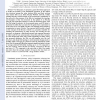Free Online Productivity Tools
i2Speak
i2Symbol
i2OCR
iTex2Img
iWeb2Print
iWeb2Shot
i2Type
iPdf2Split
iPdf2Merge
i2Bopomofo
i2Arabic
i2Style
i2Image
i2PDF
iLatex2Rtf
Sci2ools
124
click to vote
ICC
2009
IEEE
2009
IEEE
A Game-Based Self-Organizing Uplink Tree for VoIP Services in IEEE 802.16j Networks
— In this paper, we propose a game theoretical approach to tackle the problem of the distributed formation of the uplink tree structure among the relay stations (RSs) and their serving base station (BS) in an IEEE 802.16j WiMAX network. Unlike existing literature which focused on the performance assessment of the network in the presence of the RSs, we investigate the topology and dynamics of the tree structure in the uplink of an 802.16j network. We model the problem as a network formation game, with the RSs being the players. In the proposed game, each RS aims to maximize its utility that accounts for the gains from cooperation in terms of bit error rate (BER) and the costs resulting from multi-hop transmission in terms of delay. The proposed utility model is based on the concept of the R-factor which is a parameter suitable for assessing the performance of VoIP services. For forming the tree structure, we propose a distributed myopic best response dynamics in which each RS can auto...
| Added | 21 May 2010 |
| Updated | 21 May 2010 |
| Type | Conference |
| Year | 2009 |
| Where | ICC |
| Authors | Walid Saad, Zhu Han, Mérouane Debbah, Are Hjørungnes, Tamer Basar |
Comments (0)

